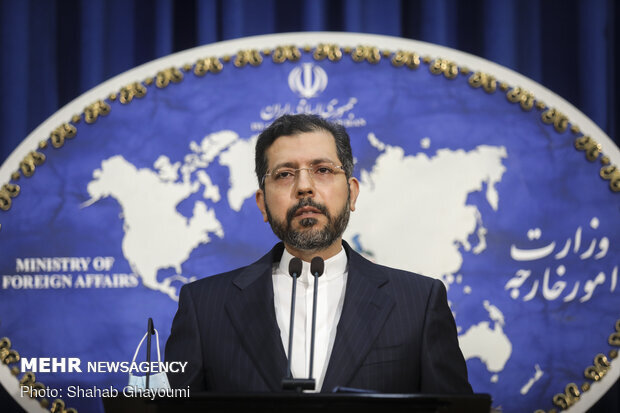S. Korean delegation in Tehran to discuss Iran’s frozen funds

TEHRAN — Foreign Ministry spokesman Saeed Khatbizadeh has said that the South Korean delegation’s visit to Tehran is aimed at negotiating Iran’s frozen financial resources.
“The delegation that has arrived in our country is part of a delegation led by the South Korean deputy foreign minister, which is set to travel to Tehran on Sunday,” Khatibzadeh said on Thursday.
He rejected an earlier report that the visit is related to the seizure of South Korea’s tanker in the Persian Gulf by Iranian naval forces for repeated violations of maritime environmental law.
“The delegation’s trip was agreed upon before the seizure of the violating Korean tanker, and its main agenda is to discuss access to Iran’s financial resources in Korea,” he added.
The remarks came two days after South Korea’s Foreign Ministry spokesperson Choi Young-sam said a delegation, led by Director-General for African and Middle Eastern Affairs Koh Kyung-sok, would soon leave for Tehran to resolve the issue of the seizure of MT Hankuk Chemi tanker through negotiations.
Iranian authorities have been pressing South Korea to release between $6.5 billion and $9 billion dollars in funds that had been frozen since 2018 when the United States imposed its unilateral sanctions on Iran.
The release of the funds would enable Tehran to purchase medicine and medical equipment needed to fight the coronavirus pandemic.
Iran has repeatedly called on Seoul to abandon its “illegal” policies and release the Iranian assets that it has frozen due to the U.S. sanctions so that Tehran can step up its fight against COVID-19.
“We expect South Korea to review its illegal approaches and also speed up the implementation of other negotiated solutions in addition to facilitating the trade in humanitarian items,” government spokesman Ali Rabiei said in remarks on July 28, after he himself tested positive for COVID-19.
This would enable the Iranian nation “to gain access to its financial resources as soon as possible and overcome its economic and health problems emanating from the coronavirus spread,” he added.
Hossein Tanhaei, head of the Iran-South Korea Joint Chamber of Commerce, on Sunday announced Iran’s decision to use its frozen money for COVID-19 vaccines
“Yesterday, we had a meeting with First Vice President Es'haq Jahangiri about our country's blocked money in South Korea, and suggestions were made to be presented to South Korea on how to barter our money in this country with a variety of goods including COVID-19 vaccine,” Tanhaei told ILNA.
Earlier, President Hassan Rouhani had reacted to Seoul’s blocking of Iranian assets, saying: “South Korea’s ban on Iran’s use of its central bank resources to buy basic goods, medicine, and humanitarian items is by no means acceptable, and we expect Seoul to lift this restriction as soon as possible.”
Over the past two years, economic relations between Tehran and Seoul have fallen sharply under the increased U.S. sanctions against Iran.
Before re-imposing U.S. sanctions in 2018, South Korea had $4 billion in annual exports to Iran and $8 billion in Iran imports.
MH/PA
Leave a Comment